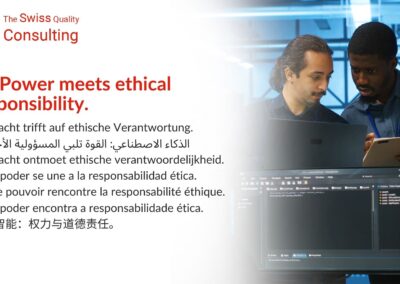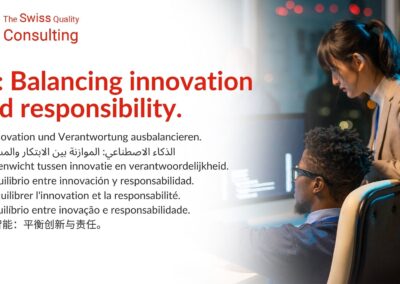Understanding the Ethical Challenges of AGI
Introduction to the Ethical Implications of AGI Development
The ethical implications of AGI development are a pressing concern for business executives, mid-level managers, and entrepreneurs, especially in the rapidly evolving landscapes of Saudi Arabia and the UAE. As Artificial General Intelligence (AGI) becomes more integrated into various sectors, the potential displacement of human jobs and the impact on societal structures cannot be ignored. This development raises significant questions about the balance between technological innovation and ethical responsibility. In cities like Riyadh and Dubai, where technological advancements are at the forefront, understanding these implications is crucial for sustainable growth and development.
One of the primary ethical concerns is the potential displacement of human jobs. As AGI systems become more capable, they can perform tasks traditionally carried out by humans, leading to job losses in various industries. This displacement can result in significant economic and social challenges, particularly in regions that rely heavily on certain job sectors. For instance, in Saudi Arabia and the UAE, industries such as oil and gas, finance, and tourism might face disruptions, necessitating proactive measures to manage the transition and reskill the workforce.
Additionally, the development of AGI brings about concerns related to societal structures. The integration of AGI into daily life could alter social dynamics, affecting how individuals interact with each other and with technology. This shift may lead to increased dependency on machines, raising questions about the erosion of human skills and the potential loss of personal agency. As leaders in technological innovation, Saudi Arabia and the UAE have a responsibility to ensure that AGI development aligns with ethical standards, promoting a balanced approach that prioritizes human well-being.
Addressing Ethical Concerns Through Change Management and Executive Coaching
Effective change management is essential for addressing the ethical concerns associated with AGI development. Business leaders in Riyadh and Dubai must adopt strategies that facilitate smooth transitions and minimize the negative impacts of AGI on the workforce. This involves implementing comprehensive reskilling and upskilling programs to prepare employees for new roles created by AGI. By investing in continuous learning and development, organizations can help their workforce adapt to changing job requirements, ensuring that employees remain valuable contributors in an AGI-driven economy.
Executive coaching services play a pivotal role in this transformation. Through targeted coaching, leaders can develop the skills necessary to navigate the complexities of AGI integration. This includes fostering effective communication, promoting transparency, and building trust within the organization. By engaging with executive coaching, leaders can enhance their ability to manage change, address employee concerns, and create an inclusive environment that values human contributions alongside technological advancements. In cities like Riyadh and Dubai, where rapid technological changes are the norm, such leadership development is crucial for maintaining a competitive edge.
Furthermore, management consulting can provide valuable insights into ethical AGI implementation. Consultants can assist organizations in developing ethical guidelines and frameworks that govern AGI use, ensuring compliance with local and international standards. By prioritizing ethical considerations, businesses can build a reputation for responsible innovation, attracting investors and customers who value sustainability and ethical practices.
Leveraging Blockchain and the Metaverse for Ethical AGI Development
The integration of Blockchain technology and the Metaverse presents unique opportunities for addressing the ethical implications of AGI development. Blockchain can enhance the transparency and accountability of AGI systems by providing secure and immutable records of AI decisions and actions. This transparency is crucial for building trust and ensuring that AGI operates within ethical boundaries. In Dubai, where Blockchain is already being utilized in various sectors, its application in AGI can set a precedent for ethical technology use, promoting responsible innovation.
The Metaverse, a virtual reality space where users interact with digital environments, offers a platform for exploring the societal impacts of AGI in a controlled setting. Businesses can use the Metaverse to simulate AGI-driven scenarios, assessing their potential effects on job markets and social structures. This proactive approach allows stakeholders to identify and address ethical concerns before implementing AGI in the real world. In Riyadh, leveraging the Metaverse for ethical AGI development can support the city’s vision of becoming a hub for technological innovation while prioritizing human-centric values.
In summary, the ethical implications of AGI development require a balanced approach that considers the potential societal impacts and addresses them responsibly. By integrating change management, executive coaching, and management consulting, businesses in Saudi Arabia and the UAE can navigate the complexities of AGI implementation effectively. Furthermore, leveraging Blockchain and the Metaverse can enhance transparency and allow for ethical exploration, ensuring that AGI development contributes positively to society.
#AGI #ArtificialIntelligence #EthicalImplications #SaudiArabia #UAE #Dubai #Riyadh #Leadership #Management #Blockchain #Metaverse #BusinessInnovation #ExecutiveCoaching #ChangeManagement































